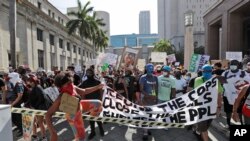Police officers fired tear gas on demonstrators who made their way onto Interstate 4 in downtown Orlando on Sunday night as several cities and counties across Florida issued nighttime curfews to curb the large crowds gathering to protest the latest killings of black people by police.
Orlando Police officials tweeted that demonstrators threw rocks, bottles and construction equipment, and they were forced to temporarily close a section of the main highway that goes through the metro area Sunday night.
In Miami-Dade, the state's most populous county, Mayor Carlos Gimenez said he would postpone the reopening of the county's beaches, which had been scheduled to reopen Monday for the first time since March when they were closed to stem the spread of the new coronavirus.
Officials said nightly curfews would continue until the threats of protests turning violent subside.
In Miami, Fort Lauderdale, West Palm Beach, Jacksonville, Orlando and Tampa, peaceful protests turned more violent at times over the weekend, with some people throwing objects at law enforcement officers dressed in riot gear. At times, police used tear gas to back the crowds up.
In West Palm Beach, protesters briefly blocked Interstate 95 on Sunday.
Miami Police Chief Jorge Colina said during a Sunday news conference that just 13 of the 57 people arrested live in the city of Miami. "Please don't make the mistake of letting someone from outside suck you in to destroy our city," he said.
But Miami-Dade Department of Corrections records show 30 of those arrested have Miami-Dade County addresses. Eleven others were from South Florida's Broward and Palm Beach counties, while seven were listed as non-Florida residents and six were homeless.
"It's important to understand that just because their drivers license says one address, doesn't mean they live there," corrections spokesman Juan Diasgranados told the Miami Herald. "For example: They could have an address registered out of state and be going to school down here."
Protesters were demanding justice for George Floyd, a black man who died after pleading for air as a white police officer in Minneapolis pressed a knee on his neck last week. The officer was charged, but that hasn't stemmed the protests happening in cities nationwide.
Many protests were largely peaceful across the state Sunday with thousands gathering in Daytona Beach, Jacksonville, Stuart and Tampa. Some organizers intensified efforts to contain their demonstrations and prevent the violence.
In Tampa, Black Lives Matter organizers had nearly 100 safety marshals in fluorescent vests patrolling their march, trained in de-escalation tactics and ordered to be on the lookout for antagonists. The group also had medics, used walkie-talkies to quickly squelch outbursts.
"We wanted to be able to provide a safe space for their voice and rage to be heard within a controlled environment. It's part of their amendment rights for them to be able to express themselves," said Chaikirah Parker, who helped organize the event.
The veteran activist said they purposely held the event early Sunday, despite sweltering heat, because it brought a more peaceful demographic.




